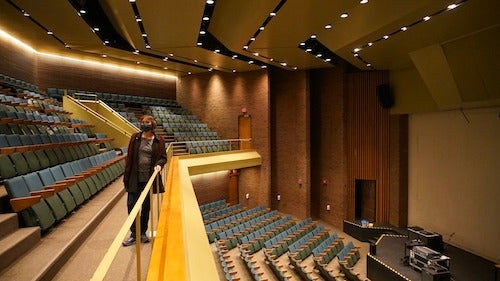Editor:
Brandon Sweet
University Communications
bulletin@uwaterloo.ca
Winter term will begin online

President and Vice-Chancellor Vivek Goel and Vice-President, Academic & Provost James Rush have confirmed the University's plans for the winter term in a series of communications to the campus community yesterday in light of concerns surrounding the Omicron variant.
While remaining exams in the examination period will continue as previously scheduled, when classes resume in the winter term on January 5, 2022, the vast majority of them will be online until at least January 24, 2022.
"This week we have continued to discuss plans for the winter term with public health officials," the president and provost write. "While we remain hopeful that we can get back to in-person experiences, the introduction of the Omicron variant has altered the trajectory of the pandemic."
"While much remains to be learned about this new variant, it is clear that it is spreading at a much faster rate than previous variants, and there is a decreased immune protection to disease transmission from both previous infection and immunization. There is evidence that two doses of vaccine provide a degree of protection from severe disease. A third dose provides greater protection for disease transmission and severe disease. Data is still emerging on the severity of disease caused by this variant, but even if it is less severe, with the rapid transmission even in highly immunized populations, there will once again be risks of overwhelming our already stretched health care system. Furthermore, with the high transmissibility of Omicron, there may be very high levels of absenteeism as large numbers of people are required to go into isolation."
"We will need to do our part to reduce levels of contacts in the community to flatten the curve and ensure time for people to receive third doses of a vaccine. This means we need to make some short-term changes to our plans based on the guidance we have received from public health officials."
Learning and working will happen primarily online prior to January 24
"When the new academic term begins on January 5, we will start teaching and learning online," Goel and Rush write. "We expect to return to in-person experiences as of January 24, as public health conditions allow. We are extremely grateful that so many instructors have made plans for this eventuality."
- We know that some learning must continue to happen in person. Some courses and learning activities, including clinical programs and some lab-based experiences, will continue in person. Students in these courses can expect to hear about academic plans from their program or faculty.
- Our residences will remain open for those students living there. Our residence community can expect to hear more from Campus Housing over the next few days.
- Access to campus will remain available for employees with essential work to complete or continue, and instructors who need to make preparations for the winter term.
- Food Services and Athletics facilities will continue to operate in line with provincial guidelines and we will continue to make some study spaces available on campus. In all public places, you must continue to wear a mask and physically distance from others.
- Research activities will also continue in person, and researchers can expect to hear more from the Vice-President, Research and International if any changes are required to current research activities.
The leaders' communication also states that employees who can work from home should continue to do so until January 24. Academic buildings will remain open, except for holiday closures during which access can be arranged where necessary for essential academic and research purposes.
"These changes are designed to promote safety, to give us all certainty in another period of change, and to give us all time to get booster shots when we become eligible," Goel and Rush write. "We remain hopeful that taking these actions now we can get back to our plan to expand in person experiences for everyone this winter. We will continue to work closely with public health officials over the winter break and if these temporary measures for the winter term need to change or be extended, we will let you know as soon as possible in the new year."
"We know changing plans at this point in the year is difficult and creates extra stresses for many of you. We also acknowledge that the current situation requires you all to dig deep into your reserves of energy and passion for the University that have been drained over the last two years. We are extremely grateful and proud of the resilience this community has shown throughout the pandemic. Despite these late changes the new variant is forcing, we hope you are able to stay safe and rest over the winter break."
"Please keep watch on your email, our social media channels, and the COVID-19 website for more help and information."
If you are struggling with your mental health during these changing times, reach out for support through Human Resources, Occupational Health, Here247 and Wellness Together Canada.
Ongoing employees can access supports through Homewood Health, the University’s Employee and Family Assistance Program partner or at 1-800-663-1142. Topics include managing stress and anxiety, building resilience, dealing with financial stress, work life balance and more.
Students are also encouraged to reach out for support. The Universty has many resources available to you including counsellors, physicians, and nurses available to help. Book an appointment with Health Services at 519-888-4096 or Counselling Services at 519-888-4567, ext. 32655. You can also connect with Empower Me at 1-833-628-5589.
Preliminary results of the equity survey to be released early January
A preliminary report of the equity survey with breakdowns by campus, students, faculty, and staff will be released in January 2022. That’s according to Institutional Analysis and Planning (IAP) and the Equity Office, which launched the equity survey in June 2021, to almost 50,000 students, faculty and staff.
The goal of the survey is to initiate an ongoing confidential collection of demographic data to better understand the composition of the UWaterloo community and to inform equity initiatives across the institution. The Equity Office, the Equity Data Advisory Group, and IAP have expressed their appreciation to members of the campus More community who completed the survey. The ongoing equity data gathering will ensure that the institution builds and maintains an accurate picture of its community, even as new students, faculty, and staff join the University.
The results of the initial survey will be reported in several stages and customized reports will be available on request. The reports will be used to inform three main questions:
- How does the makeup of UWaterloo's community compare to Waterloo Region, Ontario, and Canada?
- Are equity-deserving groups participating in the programs and services that UWaterloo offers, and how does their participation compare to other groups and the overall University community? What are the gaps and how can they be addressed?
- Do some groups experience fewer benefits and/or more barriers while learning or working at UWaterloo, compared with the overall University community? What can be done to improve any gaps?
Learn more about the equity survey in this Q&A with Jermal Jones, Manager, Equity Office, originally published in the September 2021 issue of the Catalyst Anti-racism newsletter.
Why do an equity survey?
An objective of the University's strategic plan is to improve the representation, participation, and engagement of equity-deserving groups within our community. Collecting equity data is important because it aids university leadership in taking concrete steps to identify and remove institutional barriers to equity. By participating, we are all contributing to Waterloo’s vision of a more equitable work and learning environment for all.
How will the University use this information?
The survey results will be used to help the University, faculties, and academic support units understand how to improve the representation of equity deserving groups and to increase their participation in and benefits from the programs and services that are offered. The goal is to create a more equitable campus, which includes spaces, programs, and supports for equity-deserving groups.
Can you share any updates on preliminary statistics?
For now, the best way to get an update on survey response rates is to check the Leader Board webpage. This page shares participation rates across campus. More information will be available once the preliminary report and final report has been released.
Where can I go to learn more?
Please explore the equity survey Information webpage. You can also listen to episode 103 of the Beyond the Bulletin podcast from September 24, 2021. A segment of that episode features Jermal Jones speaking with host Pamela Smyth.
Humanities Theatre closed for renovations and upgrades, opens up historical gems

This story was originally published on the Faculty of Arts website.
Over the lockdown(s), the Humanities Theatre in Hagey Hall quietly changed hands from being centrally managed for all its years of operation to Faculty of Arts management. Given its location and name, many might have assumed the theatre had always lived under the administrative umbrella of Arts, but that’s not the case — until now.
Today, Janelle Rainville, Director of Production and Theatre Operations (Department of Communication Arts), is hard at work to ensure the Humanities Theatre will be safe and modernized for all theatre users. “Inspections by independent accessors have identified health and safety concerns that need to be addressed immediately,” says Rainville. This means the theatre is now closed for one year while necessary renovations are completed. “We plan to re-open, including welcoming rentals again, in 2023.”

Janelle Rainville stands at the theatre's balcony railing.
The list of renovations includes enclosing the balcony railing to meet building code, upgrading the stage rigging system, replacing the asbestos fire curtain and upgrading the fire safety system, and installing proper safety equipment for staff, faculty, and students working at heights in all areas of the theatre.
In researching the Humanities Theatre history and consulting with external experts, Rainville discovered something exciting. In a note to the Dean of Arts Office this summer, she wrote: “I wanted to share a fun fact that I just learned from our fly system consultant, Rick Boychuk, who wrote the book (actually, two books) on the history of theatrical fly systems. I’d been sending him building drawings and whatever paperwork I found. He got super excited when he saw the drawings: The Humanities theatre was designed by George Izenour, a huge figure in theatre architecture and technology. Rick says ‘Wow. Just wow. This is huge.’”

Archival photo of the Humanities Theatre under construction, circa 1970.
Who knew? It turns out the Humanities Theatre was designed by a “leading innovator in the field of theatrical design and technology” credited with over 27 patents for various technologies and design improvements — according to Wikipedia.
Rainville also reports other historical gems and time-capsules found backstage and in other parts of the theatre. Here are a few from her list of discoveries:
- A paint frame that is one of only a dozen or so that still exist in Canada. It allows scenic painters to work on drops (backgrounds) that are approximately 40 by 30 feet. The paint frame is still functional, though needs a little love
- The sound booth was a museum for audio technology. It included a record player, a reel-to-reel machine, an 8-track player, and a cassette deck. All were still in working order.
- Photos of the original lighting system that was installed in 1970 plus photos of the Theatre of the Arts’ original lighting system from 1965.
- Scads of original drawings, plans, and photos of the space during its original construction and seating renovation in 2000.
- The Wheel of Death stage prop from a FASS production, along with many other FASS memorabilia.
Kathryn MacDonald, Arts Executive Officer, says the adoption and renovation of Humanities Theatre is a tremendous opportunity. “The Faculty of Arts will develop a theatre destination for Kitchener-Waterloo that will attract shows and visitors from all over while serving our campus community as a fully updated presentation and performance space. And there is great potential for experiential learning for our students involving stage and set design, working with sophisticated rigging, and other theatre technologies.”
Rainville’s colleague Chris Greenhalgh, Director of Technical Theatre, has reclaimed the backstage workshop, upgrading it with newer tools and equipment, plus required safety features, to make a fully functional space where students have attended carpentry labs since September.
Also manager of the 400-seat Theatre of the Arts in ML and Studio 180 black box theatre in Hagey Hall, Rainville is currently making every effort to assist more than 50 rental bookings for the Humanities Theatre that had to be cancelled in finding alternative arrangements on campus and in the region.
“We’re lucky to have Janelle and Chris,” says MacDonald, “who have years of theatre operations and technology experience, to guide these plans and renovations.”
Web conferencing platform review and consolidation project update
A message from Information Systems & Technology (IST).
During the pandemic, the number of web conferencing platforms used by employees and students to support remote teaching, learning, and job responsibilities increased considerably. This increase has resulted in some confusion around which tools are recommended and for what use case(s); a disparate set of support models and resources; and a lack of consistency for students and employees who may be required to use multiple platforms across courses and job duties.
Information Systems & Technology (IST) has launched a project to review the web conferencing platforms available and determine which tools will be recommended and fully supported by IST, with the goal of reducing the growing set of tools to a smaller, more sustainable offering.
The results of this work are expected to be made available in early February 2022.
You are invited to contact the project manager, Tara Hillis, should you have questions or would like to learn more about this work.
Beyond the Bulletin Episode 113

The latest episode of the Beyond the Bulletin podcast is now live, and it's our last one of the year. We revisit the top Waterloo stories of 2021. Concerns about the Omicron variant have prompted some operational changes at the University, including cancelling end-of-year gatherings and in-person meetings. When the new term starts, teaching and learning will be online, with some exceptions. December 23 is the last working day of 2021 for most employees. The podcast will return in January 2022.
Upcoming office closures
The Writing and Communication Centre will be closed today from 11:00 a.m. to 4:30 p.m. for their end of year staff appreciation/holiday event.
Link of the day
One ring to rule them all: 20 years later, an oral history of The Fellowship of the Ring
When and Where to get support
Students can visit the Student Success Office online for supports including academic development, international student resources, immigration consulting, leadership development, exchange and study abroad, and opportunities to get involved.
Instructors looking for targeted support for developing online components for blended learning courses, transitioning remote to fully online courses, revising current online courses, and more please visit Agile Development | Centre for Extended Learning | University of Waterloo (uwaterloo.ca).
Instructors can visit the Keep Learning website to get support on adapting their teaching and learning plans for an online environment.
Course templates are available within your course in LEARN to help you build and edit your content and assignment pages quickly.
The following workshops, webinars, and events are offered by the KL team (CTE, CEL, ITMS, LIB):
- Independent Remote Course Design Essentials, self-directed, continuous self-enrollment course in LEARN.
- Independent Blended Course Design (iBlend), self-directed, ongoing
- Copyright Overview for Waterloo Instructors and Staff - self-directed, continuous self-enrollment course in LEARN.
Employees can access resources to help them work remotely, including managing University records and privacy of personal information. Here are some tips for staying healthy while working from home.
Stay informed about COVID cases on campus by consulting the COVID case tracker.
The Writing and Communication Centre has virtual services and programs to help undergrads, grad students, postdocs and faculty members with academic writing.
- Meet with writing advisors in one-to-one appointments to brainstorm, draft, revise, and polish. No time for an appointment? Try email tutoring for undergrads.
- Beat isolation and make writing progress at weekly Virtual Writing Cafés for grad students and faculty or PJ-Friendly Writing Groups for Undergrads.
- Take an online workshop or apply to our popular Dissertation Boot Camp program.
- Faculty can request custom in-class workshops for their courses, or the WCC can facilitate any existing workshops for student groups.
Co-op students can get help finding a job and find supports to successfully work remotely, develop new skills, access wellness and career information, and contact a co-op or career advisor.
The Centre for Career Action (CCA) is offering virtual services only until we close for the winter break on December 23rd at 2:00pm EST. When we re-open on January 4, all of our services will continue to be offered virtually.Questions about CCA's services? Live chat or call us at 519-888-4047 between 8:30 a.m. and 4:30 p.m. EST, Monday to Friday.
If you feel overwhelmed or anxious and need to talk to somebody, please contact the University’s Campus Wellness services, either Health Services or Counselling Services. You can also contact the University's Centre for Mental Health Research and Treatment. Good2Talk is a post-secondary student helpline available to all students.
While the Library continues to focus on digital resources and consultations, our spaces are open for the fall term. Dana Porter Library is open Monday to Friday, 9 a.m. to 5 p.m., and Davis Centre Library is open Monday to Friday, 9 a.m. to 11 p.m., and Saturday and Sunday, 11 a.m. to 5 p.m. for drop-in individual study space, bookable individual study rooms, drop-in access to computers and printers, book pick-up services and IST Help Desk support. Special Collections & Archives and the Geospatial Centre will be accessible by appointment. Library staff are available for questions via Ask us. Full details on current services and hours are available on the Library’s COVID-19 Update webpage.
The Faculty Association of the University of Waterloo (FAUW) continues to advocate for its members. Check out the FAUW blog for more information.
The University of Waterloo Staff Association (UWSA) continues to advocate for its members. Check out the UWSA blog for more information.
The Sexual Violence Prevention and Response Office (SVPRO) supports all members of the University of Waterloo campus community who have experienced, or been impacted, by sexual violence. This includes all students, staff, faculty and visitors on the main campus, the satellite campuses, and at the affiliated and federated Waterloo Institutes and Colleges. For support, email: svpro@uwaterloo.ca or visit the SVPRO website.
The Office of Indigenous Relations is a central hub that provides guidance, support, and resources to all Indigenous and non-Indigenous campus community members and oversees the University's Indigenization strategy.
The Waterloo Indigenous Student Centre, based at St. Paul’s University College, provides support and resources for Indigenous students, and educational outreach programs for the broader community, including lectures, and events.
WUSA supports for students:
Peer support - MATES, Glow Centre, RAISE, Women’s Centre - Visit https://wusa.ca/peersupport to book an appointment either in person or online for the Fall term.
Food Support Service food hampers are currently available from the Turnkey Desk 24/7 in the Student Life Centre. Drop off locations are also open again in SLC, DC, DP, SCH and all residences.
Co-op Connection all available online. Check https://wusa.ca for more details.
Centre for Academic Policy Support - CAPS is here to assist Waterloo undergraduates throughout their experience in navigating academic policy in the instances of filing petitions, grievances and appeals. Please contact them at caps@wusa.ca. More information is available.
WUSA Student Legal Protection Program- Seeking legal counsel can be intimidating, especially if it’s your first time facing a legal issue. The legal assistance helpline provides quick access to legal advice in any area of law, including criminal. Just call 1-833-202-4571.
Empower Me is a confidential mental health and wellness service that connects students with qualified counsellors 24/7. They can be reached at 1-833-628-5589.
GSA-UW supports for graduate students:
The Graduate Student Association (GSA-UW) supports students’ academic and social experience and promotes their well-being.
Advising and Support - The GSA advises graduate students experiencing challenges and can help with navigating university policies & filing a grievance, appeal, or petition.
Mental Health covered by the Health Plan - The GSA Health Plan now has an 80 per cent coverage rate (up to $800/year) for Mental Health Practitioners. Your plan includes coverage for psychologists, registered social workers, psychotherapists, and clinical counsellors.
Dental Care - The GSA Dental Plan covers 60 per cent to 70 per cent of your dental costs and by visiting dental professionals who are members of the Studentcare Networks, you can receive an additional 20 per cent to 30 per cent coverage.
Student Legal Protection Program - Your GSA fees give you access to unlimited legal advice, accessible via a toll-free helpline: +1-833-202-4571. This advice covers topics including housing disputes, employment disputes, and disputes with an academic institution.
The Graduate House: Community Space Open M - F @ 11:30 a.m. to 6:00 p.m. - We’re open to all students, faculty, staff, and community members. The Graduate House is run by the GSA-UW. Graduate students get special discounts. We are hiring all positions. Bring your resume to the bar.
BIPOC Student Collective - The Collective is a safe space for BIPOC LGBTQ2+ students and aims to foster intergenerational and peer-to-peer support and mentorship. Join the online Discord channel for solidary chats and drop-in sessions.
When and Where (but mostly when)
Healthy Warriors at Home (Online Fitness).
Warriors vs. Laurier Blood Donation Battle. Join your fellow Warriors, donate blood and help us win the Blood Battle against Laurier for a second year in a row. Set up a profile or add the PFL code: UNIV960995 to your account if you have a blood.ca account already. Questions? Contact WarriorsInfo@uwaterloo.ca.
Drop-in to Warrior Virtual Study Halls on Wednesdays from 5:30 p.m. to 7:00 p.m. Come together in this virtual space to set goals and work independently or in groups each week.
Renison English Language Institute continues to offer virtual events and workshops to help students practice their English language skills.
Finance and Student Financial Services will be closed to in-person service in EC5 until the new year. Students, please visit The Centre in Needles Hall or contact Student Financial Services at our helpdesk.
Fall 2021 examination period, Thursday, December 9 to Thursday, December 23.
PDAG Seminar featuring Andrea Chappell: "So long and thanks for all the fish..."; an imminent retirement review, Friday, December 17, 9:00 a.m. to 9:45 a.m., Microsoft Teams.
Co-operative work term ends, Thursday, December 23.
University holiday closure, Friday, December 24 to Monday, January 3, 2022.